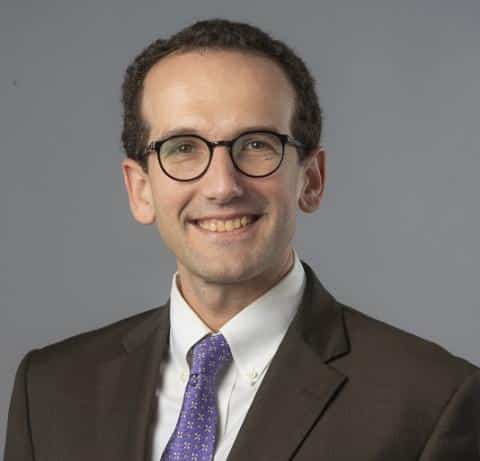
The Environmental Advocacy Clinic
Overview
As one of the nation’s top-ranked environmental law schools, Vermont Law and Graduate School offers students the chance to apply what they learn in the classroom by working in one of the best environmental law clinics in the country: the Environmental Advocacy Clinic.
The Environmental Advocacy Clinic is an in-house clinic that operates as a public interest law office, teaching students how to be lawyers by representing clients in need. Clinical experience helps students become well-rounded, skilled professionals who can develop arguments and claims from the ground up, explore strategies and options, as well as communicate effectively with clients, courts, agency officials, scientific experts, and opposing parties.

Highlights
In the Clinic, students serve lead attorneys, supervised by experienced lawyers, representing clients—including leading national conservation organizations and local community groups to promote access to justice on important environmental and natural resources issues. We’ve created positive outcomes for clients in a variety of areas including:
Protecting New England’s Mature Forests
VLGS students are advocating for the protection of mature forests critical to the region’s climate resilience and biodiversity, representing our client Standing Trees, a grassroots membership organization that works to protect and restore New England’s forests for the benefit of the climate, clean water, and biodiversity, with a focus on state and federal public lands in New Hampshire and Vermont.
Students are now challenging several U.S. Forest Service proposed logging projects in the White Mountain National Forest that seek to log mature forests with outstanding natural resource value and have filed formal objections to these projects. Students are also using the Freedom of Information Act and state public records laws to obtain important agency documents about these projects and other forest and wildlife protection issues. The students’ advocacy seeks to ensure that the Forest Service uses the best available science in considering logging projects and fully complies with relevant federal environmental protection laws and guidance – including the National Forest Management Act, the National Environmental Policy Act, and the Endangered Species Act.
Protecting Communities from Pollution
A team of students filed comments with the Federal Energy Regulatory Commission (FERC) calling for a comprehensive analysis of flooding and natural resource impacts on the relicensing of the Pensacola Dam in northeastern Oklahoma. The dam exacerbates flooding upstream, especially along the highly contaminated Tar Creek.
One of the first superfund sites in the country, Tar Creek is laden with toxic pollution from long-abandoned lead and zinc mining operations in the area. Students are continuing to work to ensure that during the relicensing process, FERC takes responsibility for comprehensively analyzing upstream flooding exacerbated by the dam, climate change impacts on the dam’s operations, impacts of toxic pollution, and compliance with the Endangered Species Act.
Who We Are
-
Christophe Courchesne
- Associate Dean, Environmental and Experiential Programs
- Director, Environmental Law Center
- Director, Environmental Advocacy Clinic
- Associate Professor
Expertise: Administrative Law, Energy Law and Regulation, Environmental Law -
Taylor Cox
- Program Coordinator, EAC/EJC
Environmental Advocacy Clinic News and Events

Oklahoma Communities Support Federal Action to Hold Dam Operator Accountable for Dangerous Flooding
December 22Vermont Law and Graduate School’s Environmental Advocacy Clinic files amicus brief in D.C. Circuit supporting federal ruling compelling Grand River Dam Authority to acquire …

Leading Climate Scientists Submit Amicus Brief Supporting EPA’s Clean Car Standards
December 9Environmental Advocacy Clinic Files Brief Describing Reality and Risks of Climate Change in D.C. Circuit to Help Defend Emissions Standards for Light- and Medium-Duty Vehicles…

Christophe Courchesne Named Interim Director of the Environmental Law Center at Vermont Law and Graduate School
July 18Environmental Law and Policy Expert to Lead Top Environmental Law Center Vermont Law and Graduate School (VLGS) has named Christophe Courchesne as the interim director of its …

Conservation Groups Fight for Strong Environmental Protections at Vermont Dams
June 28Friday, June 28, 2024 South Royalton, Vt. Environmental Advocacy Clinic Files Brief in D.C. Circuit and Filing with Federal Regulators to Support State Water Quality Requireme…
E&E News interviewed Christophe Courchesne in “Vermont Wants to Make Big Oil Pay. And It’s Bringing Receipts,” May 2024
Scientific American interviewed Christophe Courchesne in “Vermont Is Coming for Big Oil, Making It Pay for Decades of Climate Pollution,” May 2024.
NHPR interviewed Christophe Courchesne in “Environmental Group Sues US Forest Service for Logging Projects in White Mountain National Forest,” May 2024
InDepthNH.org credited Christophe Courchesne “Group Files Lawsuit to Challenge Logging in White Mountain National Forest,” May 2024
The Hill quoted Christophe Courchesne in “Why Trump’s Tax Law Could Limit Biden’s Efforts to Protect Arctic Wildlife from Drilling,”September 2023
EAC students Hannah Weisgerber JD’25, Janice Smith JD’25, and Sara Alimoradi MECP’24 wrote an op-ed about their roles as student attorney advocates representing Standing Trees, a nonprofit organization dedicated to protecting and restoring forests on New England’s public lands. The op-ed was published in the Valley News. Read the op-ed here. August 2023
Seven Days VT quoted Christophe Courchesne in “Vermont and Its Schools Sued Over PCBs. Will They Win?,”. July 2023
InDepthNH.org quoted Christophe Courchesne in “Challenge Filed to Proposed Logging Project in Northern Presidential Range,”. June 2023
NHPR & Concord Monitor quoted Christophe Courchesne in “Advocates object to White Mountain National Forest plan to manage land near Gorham,”. June 2023
WCAX-TV interviewed Christophe Courchesne, the Director, in “Vermont sues chemical giant Monsanto over toxic PCBs in schools, waters,”. June 2023
“Environmental Justice: The National Context,” Christophe Courchesne was a presenter and panelist, Webinar on “Environmental Justice: What Is It and Why You Should I Care,” Environmental Business Council of New England, Rhode Island Chapter. June 2023
The New York Times: Biden Aims to End Arctic Drilling. A Trump-Era Law Could Foil His Plans.
“Biden’s going to have to do another Arctic drilling lease sale no matter what,” said Patrick Parenteau. June 02, 2021
Bloomberg Law: Biden Era Brings Legal Disappointments for Environmental Groups
“It’s worse when your friends disappoint you,” Vermont Law School professor Patrick Parenteau said. June 01, 2021
Contact Us
If you have questions about the Environmental Advocacy Clinic at Vermont Law School, you are welcome to contact us. Please note that the Clinic does not typically take cases on behalf of individuals, particularly in situations involving complaints against neighbors. We select cases and projects based upon our capacity, and the degree to which they advance the public interest in environmental protection. The Clinic does not represent commercial interests.
Contact
Christophe Courchesne, Director
Phone: 802.831.1630
Taylor Cox, Program Coordinator
802.831.1630
Email: tcox@vermontlaw.edu
Mailing Address
Environmental Advocacy Clinic
Vermont Law School
PO Box 96
South Royalton, VT 05068



